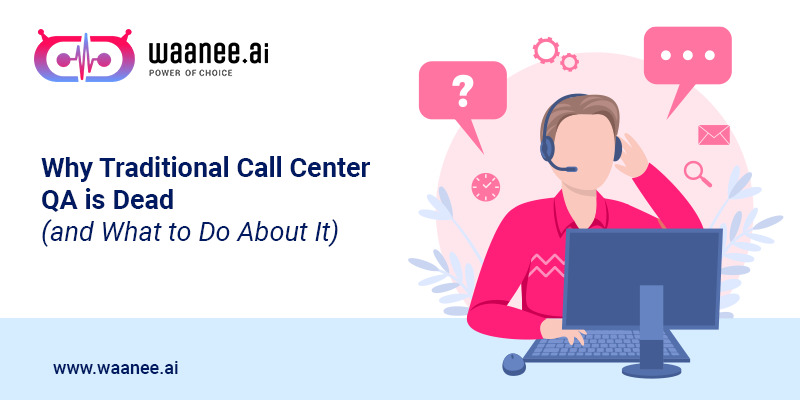
-
Waanee AI Labs
View All »

Get The Latest
Transforming Contact Centers with Waanee AI's Agentic Framework
Read More »Generative AI Voice Bots: Strategic Sweet Spots for Organizational Scale
Read More »Gen AI powered Contact center Quality Management: Beyond Basic Metrics
Read More » - Blog
Why Traditional Call Center QA is Dead (and What to Do About It)
Posted by info@waanee.ai, on 06 Jan, 2024 08:39 AM

In the dynamic landscape of customer service, the traditional approach to Quality Assurance (QA) in call centers is fading into obsolescence. The stringent, often manual, methods that once governed QA processes are now struggling to keep pace with the evolving needs of both customers and businesses. As technology advances and customer expectations shift, it becomes increasingly evident that a paradigm shift is imperative in call center QA strategies.
Why is Traditional Call Center QA Becoming Obsolete?
- Subjectivity in Evaluation: Traditional QA in call centers heavily relied on manual assessments by supervisors, leading to subjective evaluations. These assessments were prone to bias and lacked a standardized framework, resulting in inconsistent feedback and coaching for agents.
- Limited Data Insights: Earlier QA methods often reviewed only a fraction of interactions, providing a narrow view of agent performance. This restricted approach failed to capture the breadth of customer experiences and often missed crucial insights into recurring issues.
- Time-Consuming Processes: Manual QA processes were labor-intensive and time-consuming, impacting the efficiency of call centers. The delay in feedback loops hindered the timely correction of agent behaviors and customer service gaps.
- Inability to Adapt to Change: With rapidly evolving customer preferences and technological advancements, traditional QA approaches struggled to adapt. They lacked the agility needed to incorporate new channels of communication like social media, live chat, or chatbots into the evaluation process effectively.
What’s the Alternative: Modern Solutions for Call Center QA?
Data-Driven Analytics: Embracing advanced analytics and AI-powered tools is crucial for the future of QA in call centers. Machine learning algorithms can analyze a vast volume of interactions, providing comprehensive insights into customer-agent conversations. These insights enable the identification of trends, common issues, and opportunities for improvement.
Speech and Text Analytics: Implementing speech and text analytics software allows call centers to analyze interactions in real-time, identifying sentiment, keywords, and customer pain points. This enables proactive intervention, personalized coaching, and immediate resolution of issues during live interactions.
Automation and AI-Assisted QA: Automation streamlines the QA process by automatically flagging interactions that require review based on predefined criteria. AI-assisted QA tools use natural language processing to evaluate conversations, providing objective and consistent feedback to agents.
Omnichannel Approach: Modern QA strategies encompass all communication channels, ensuring a holistic evaluation of customer interactions. This approach acknowledges the shift towards multichannel customer service and guarantees a comprehensive assessment of agents’ performances across various platforms.
Continuous Learning and Improvement: Agile QA methodologies focus on continuous improvement by leveraging real-time data and feedback. Regular training sessions, coupled with actionable insights derived from analytics, empower agents to adapt to evolving customer needs and enhance their skills continually.
The Path Forward: Implementing Change
Transitioning from traditional QA approaches to modern, data-driven methodologies requires a strategic and phased approach:
Assessment and Gap Analysis: Evaluate current QA processes to identify inefficiencies and gaps. Understand the technological requirements and cultural shifts needed to embrace modern QA strategies.
Investment in Technology: Invest in cutting-edge technologies and platforms that facilitate automated QA processes, analytics, and AI-driven insights. Collaborate with vendors like Waanee.ai specializing in innovative QA solutions.
Training and Change Management: Equip supervisors and agents with the necessary training to adapt to new technologies and methodologies. Communicate the benefits of the transition and involve the team in the change process.
Continuous Monitoring and Adaptation: Regularly monitor the effectiveness of the new QA strategies and iterate based on insights gained. Embrace a culture of continuous improvement to stay responsive to evolving customer needs.
In conclusion, the traditional approach to QA in call centers is no longer sustainable in today’s fast-paced and tech-driven customer service landscape. Embracing modern, data-driven, and agile methodologies is imperative for call centers to enhance customer experiences, drive efficiency, and stay competitive in the market. By leveraging advanced technologies and fostering a culture of adaptability and continuous improvement, call centers can revitalize their QA strategies to meet the demands of the evolving customer-centric era.
Ready to transform your call center’s QA approach? Contact Waanee AI today and book a contact center QA demo to explore the future of customer service excellence!
READ ALSO...
Transforming Contact Centers with Waanee AI's Agentic Framework
25 Feb, 2025 01:52 PM
Generative AI Voice Bots: Strategic Sweet Spots for Organizational Scale
28 Dec, 2024 08:51 AM
Gen AI powered Contact center Quality Management: Beyond Basic Metrics
03 Dec, 2024 03:20 PM
OUR PRODUCTS
Cloud Telephony
Auto Summarization
Knowledge AI
Revolutionize CX
with AI power
Delivers personalized interactions and immediate, data-driven solutions powered by AI, transforming customer experiences.

We use cookies!
We use cookies to ensure that we give you the best experience on our website.
By continuing to use this site, you accept our use of cookies. Learn more
 Recruit Industries Agents
Recruit Industries Agents Build Your Agent
Build Your Agent Improve Self Service
Improve Self Service Employee Experience
Employee Experience Sales and Cross Sales
Sales and Cross Sales Calling Script
Calling Script Integration & APIs
Integration & APIs Auto Summarization
Auto Summarization Conversational Intelligence
Conversational Intelligence Sentiment Analytics
Sentiment Analytics Auto QA
Auto QA Net Promoter Score
Net Promoter Score